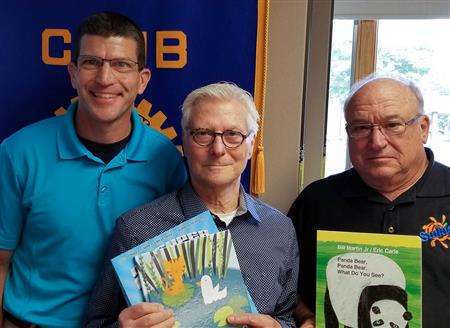Saying that science proves that books in the home are the best predictor of later reading success, Tony Pedriana addressed the club about how Jump Start to Literacy supports that goal, and encouraged Rotary support of the program.
“Having as few as 20 books in the home fundamentally influences chances for both personal and academic success,” he said. “Children raised with books in the home have a 20% more likely to finish college.”
The more books in the home, the greater the benefit, according to Tony, and each addition to the home library helps children do better. Further, it is the most successful way to improve the reading achievement of low income children.
Increasing children in low income household’s access to print is the mission of Jump Start to Literacy. The target population is preschoolers, aged 0-5, because the greatest amount of brain growth occurs during that age range.
“It’s a critical period,” said Tony. “Eighty-five percent of core brain development occurs by age three, and young children exposed to early language and literacy experiences are more likely to become proficient readers. When you reach the end of 3rd grade, the chance that you will ever become proficient, if you aren’t by then, are reduced.
“According to The National Report Card On Educational Progress, two-thirds of children in our country are less than proficient readers,” said Tony. “As to low income kids, most of them are not even basic readers.”
This is where parents reading to children can help even the score.
“Two hundred and fifty days of Good Night Moon might be wearisome to you but your child enjoyed it immensely,” he added.
Two-thirds of low income families have no books for their children, with these households having on average four books for children in the home.
Books in the home build foundational skills, and kids are learning the following when they are read to:
- Alphabetic knowledge. Being able to identify the letters of the alphabet upon entering kindergarten gives them a jump start.
- Phonemic awareness. If they already understand and have been inundated with how letters sound, they are ahead of the pack.
- Rapid naming. If before age five they can rattle off shapes, colors, princesses, heroes, it indicates a foundational skill.
- Recall. When you read to a child and engage with them about the content of what you are reading, they will build listening comprehension, which will aid them from the beginning of their school days.
Getting books to those who benefit
In River Falls, there are several spots where books are distributed, regularly, for free. They include:
- The Food Pantry has 30-40 titles available at any given time.
- Our Neighbor’s Place
- WIC (Women, Infants and Children) at the Pierce County Health Department.
- CESA 11 early head start caseworkers take books on home visits and demonstrate interactive reading in the home so parents can learn as well.
- River Falls Library hosts monthly family reading events, where kids get treats, a story and a free book. This program consistently models effective story telling techniques to parents.
”The goal is to get as many books into their hands as possible,” said Tony. He went on to explain that one of his main reasons for joining Rotary was the literacy aspect through expanding opportunities for youth.
“It’s consistent with our club mission and gets more books in homes than any other program,” he said. Further, he noted, the program is a fitting adjunct to Rotary Readers, a model early literacy program. “Our club doesn’t just talk about literacy, we do specific things to promote it.”
The books are high quality, and the organization receives them from the National Book Bank for the cost of shipping..JPG)
.JPG)
“Rotary has supported us in the past, and on behalf of the children and their families who have benefited from that, thank you,” said Tony.
